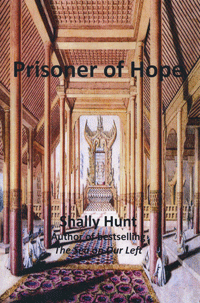Felix Carey - 'a colourful and tragic life'
The story of William Carey is well known - but what of his eldest son Felix? A new book called Prisoner of Hope chronicles a 'colourful and tragic' life as he tried to win the approval of his father's mission. Here author Shally Hunt explains how and why she came to write the book - and its relevance for mission workers today
Why did you decide to write about Felix Carey?
Historically marginalised, I felt Felix was worthy of a 21st century reappraisal. During my research I discovered that William Carey's eldest son was the 'black sheep' of the family, often described as a tiger. In 1806, at the age of 21, he was sent to set up a mission in Burma. For six years he struggled to do his father's will, but his talents were linguistic and medical rather than evangelical. Felix lost a mother from insanity, a brother from dysentery, his first wife in childbirth, his second wife and two small children in a shipwreck. As if these tragedies were not enough, he was used by the Burmese Government as a pawn in a political game between Burma and Bengal.

His political career was brief and farcical; drink, drugs and debt ensued. He abandoned his third wife and wandered about the northern states of Bengal as a European hanger-on, regarded with suspicion by both the Bengal Government and the various Rajahs who gave him hospitality. He returned to his father's mission after three years, and redeemed himself by helping his father translate the Bible and many other educational works from English into Bengali. He died in 1822, aged 37, leaving his fourth wife expecting a child.
This colourful and tragic life was too good a story to be left untold.
After going through his life, what did you learn about him?
Having lost his mother to insanity, and his father to his mission work, it was not surprising that the young Felix ran wild. When the family set up a successful mission in the Danish state of Serampore, near Calcutta, he was soon 'tamed' by his father's fellow missionary, William Ward.
Under the guidance of this surrogate father, Felix was swept into the missionary current and appeared, not only to be tamed, but eager to make his mark as a missionary. A naïf, who lacked his father's religious zeal and perseverance, Felix was unable to succeed in the mission field. He tried hard to please his father, but was seduced by the Burmese Court and all things mammon.
After his impoverished and turbulent childhood, Felix found riches and power irresistible. From his behaviour in Burma, it is possible that he may have been suffering from bipolar syndrome.
What was the most surprising thing you came across?
That Felix was responsible for bringing smallpox vaccine to Burma.
Can you explain the title Prisoner of Hope?
Felix was naively optimistic about each of his doomed ventures: deluding himself that the next farcical plan he dreamed up would not only succe
ed, but win the approval of his father's mission and the establishment. The words on his grave read: Felix Carey -
A Prisoner of Hope released.
 What are your own hopes for the book?
What are your own hopes for the book?
I would like this book to give readers an insight into the problems missionaries have to overcome, and the huge sacrifices they must make. Both William Carey and Ann Judson illustrate this in quotes that I have included from their journals. Two hundred years ago, life as a missionary in what Carey described as 'wretched wilderness', was both precarious and lonely. I hope this carefully researched book will reach out to all those who strive to bring God's word to other nations and cultures.
How has your life changed from learning more of your ancestry?
I have discovered new friends in the far-flung Carey family, both at home and abroad. I am now on the committee of the Carey Family Association which, in this digital age, is currently updating to become the Carey Family Network.Hopefully this means more Carey relatives will be able to communicate with each other and interact on line.
Being able to read William Carey's letters in the archive at Regent's Park College Oxford, is something I shall never forget. Researching my roots has given me endless pleasure, increasing my knowledge about many things, and adding another dimension to my life.
To order a copy of the book contact:
cthrnhnt@btinternet.com
Prisoner of Hope has been reviewed in our "Arts and Culture" section.